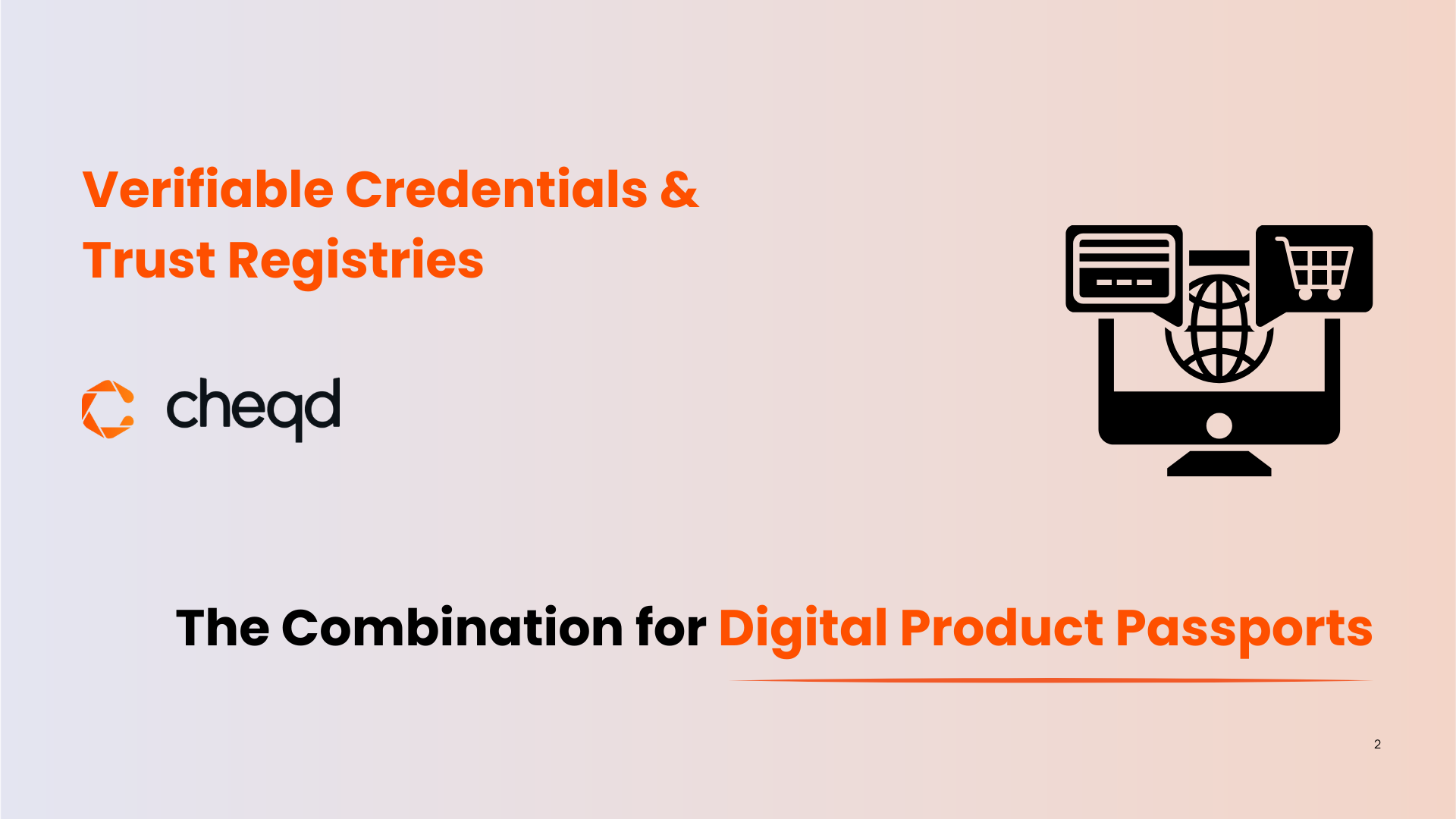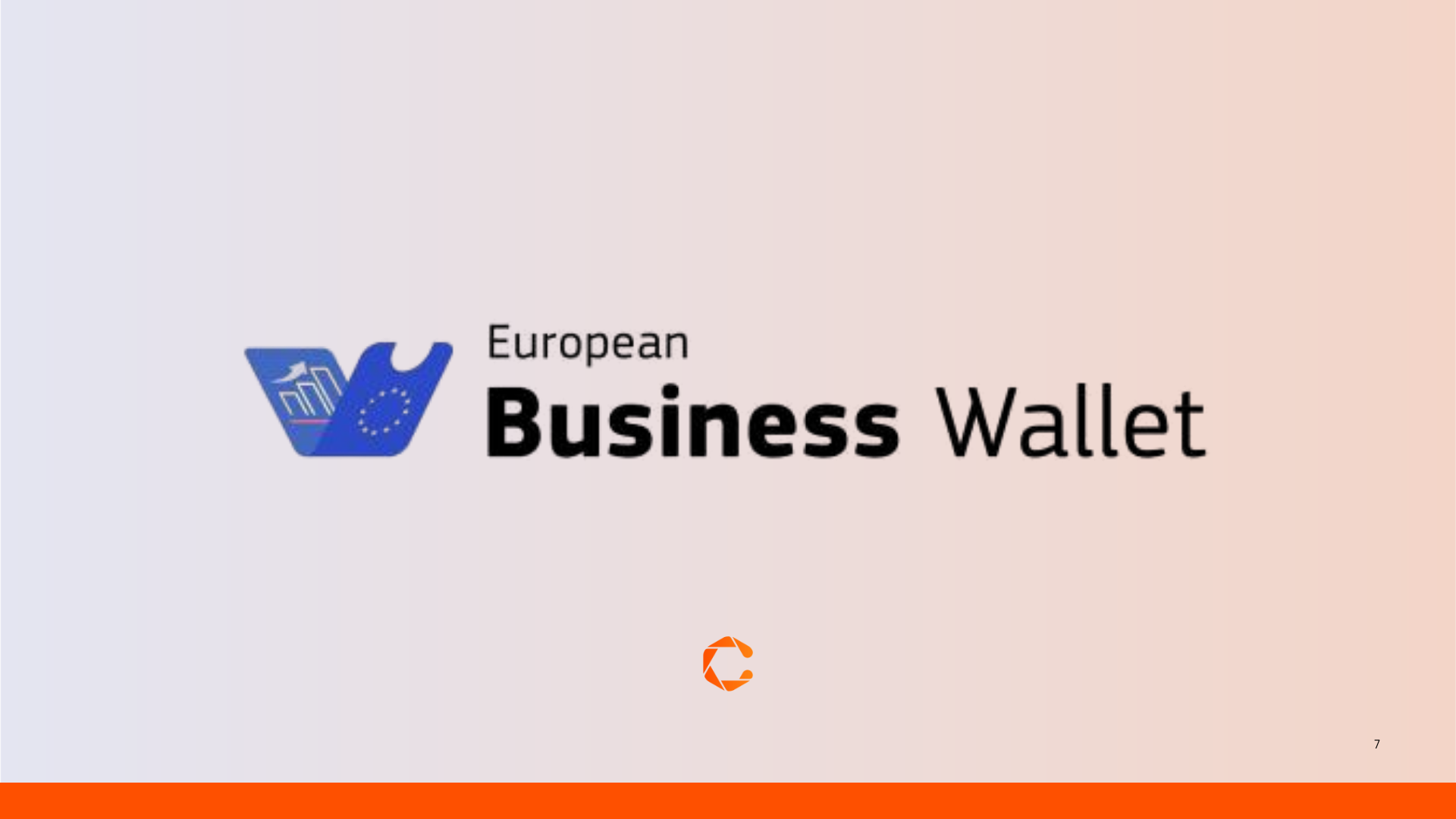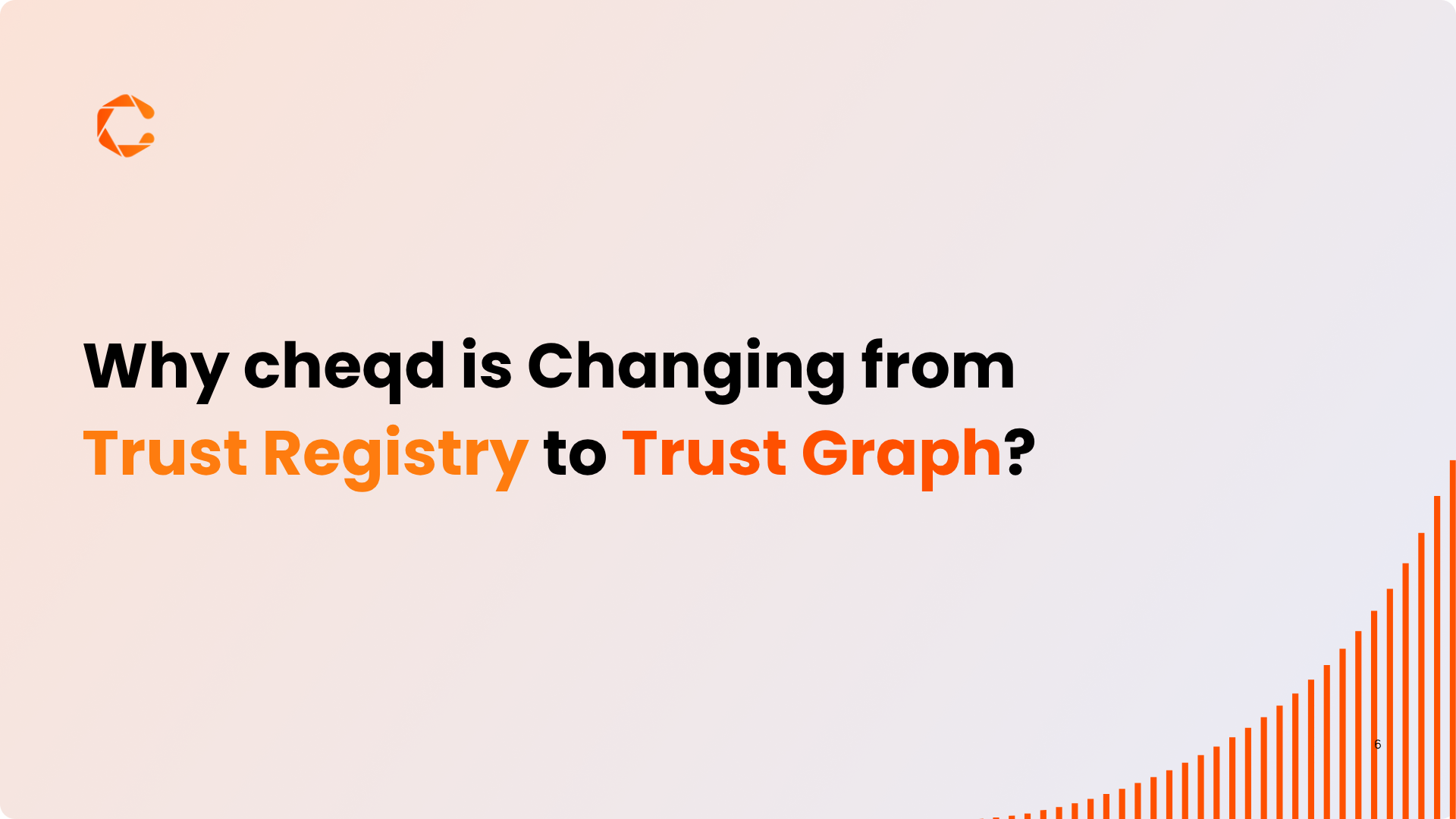Digital Product Passports (DPPs) are digital records that aggregate and store data about a product and its footprint along the supply chain. To put it simpler, DPPs comprise all the data about a product, from its origin, composition, environmental impact, to recycling eligibility. Anyone can check this information to ensure products are made responsibly. The other functions of DPPs include supporting compliance with evolving regulations, combating greenwashing, and empowering consumers and businesses to make informed decisions.
Sources matter. For DPPs to be truly effective, the information they hold must be trustworthy, tamper proof, and verifiable. This is where Verifiable Credentials (VCs) and Trust Registries (TRs) come into play. VCs provide digitally signed, secure claims about a product’s attributes. They ensure authenticity and prevent data manipulation. Meanwhile, TRs establish a framework for verifying the credibility of issuers, assuring that only authorised entities can issue trusted product data.
In this blog, we will explore why VCs and Trust Registries in a synergy creates the ideal foundation for Digital Product Passports. These technologies ensure data integrity, regulatory compliance, and consumer confidence in sustainability claims.
What Are Digital Product Passports?
Digital Product Passports work like digital IDs for products. They keep track of key product details along the supply chain such as where they come from, how they are made, and how they can be reused or recycled, from production to disposal.
Imagine buying a pair of sneakers, the DPP could tell you where the materials were made of (e.g., recycled plastic from ocean waste). It could include repair instructions to extend the sneaker’s life. It might show how much carbon was emitted during production. When it’s time to dispose of them, the DPP can point you to the nearest recycling centre.
The main benefits DPPs render are transparency, traceability, and sustainability proof. DPPs give consumers a clear view of product footprint and impact through documenting its journey from raw materials to disposal. The transparency deters bad actors from counterfeiting goods as it can be detected. Reputation can be verified easily. Besides, DPPs provide verifiable data to back up sustainability claims. No more vague “eco-friendly” labels without proof.
DPPs are of paramount importance to assure that products are made responsibly, used efficiently, and disposed of properly. In this way, they would help reduce waste and protect the environment.

EU's Digital Product Passport Regulation
Starting in 2024, the European Union is making Digital Product Passports mandatory for most products sold in the EU under the Ecodesign for Sustainable Products Regulation. This initiative improves transparency by providing structured, machine-readable data on product origin, materials, environmental impact, and disposal guidelines.
DPPs will include unique product identifiers, compliance documentation, and details on substances of concern. The accurate, verifiable information supports open data principles. Product data is more accessible and in this way it encourages industry collaboration.
For businesses, compliance is crucial. Early adopters gain a competitive edge by staying ahead of regulations. On the flip side, those failing to meet requirements risk limited market access in the EU.
Nevertheless, the EU DPPs rely on centralised databases across multiple countries, which makes it hard to identify which ones are complicit in fraudulent practices. While products move through different jurisdictions, they are more likely to be susceptible to local manipulation. What happens might be products appear compliant on paper but fail regulatory scrutiny.
The Role of Verifiable Credentials in DPPs
For Digital Product Passports to be effective, the data they contain must be trusted, tamper-proof, and verifiable. Verifiable Credentials takes a lead role here.
VCs are digitally signed, cryptographic attestations that allow authorised entities, such as manufacturers, auditors, and regulators, to issue secure, immutable claims about a product. Product information can be altered or forged in traditional databases while VCs ensure that data remains authentic and verifiable throughout a product’s lifecycle. It is easy to check its validity and source without relying on a central authority.
Key Product Attributes as Verifiable Credentials
By using VCs, various product attributes can be securely recorded and shared within a DPP, including:
- Manufacturing origin — Verify where and by whom a product was produced.
- Material composition — Provide transparency on raw materials.
- Carbon footprint — Record environmental impact data, such as emissions during production
- Recycling eligibility — Indicate whether a product or its components can be reused or recycled
Benefits of Using Verifiable Credentials in DPPs
VCs offer multiple advantages for DPPs, making them a scalable and future-proof solution:
- Interoperability — VCs are standards based and can be used across different ecosystems; ensure seamless data exchange between supply chain partners.
- Decentralisation — Unlike traditional certification systems that rely on centralised databases, VCs allow for distributed trust, which reduces single points of failure.
- User Control — VCs enable businesses and consumers to selectively share product data on a need-to-know basis, enhancing privacy while maintaining transparency.
By integrating Verifiable Credentials into DPPs, organisations can ensure secure, verifiable, and privacy preserving product data. This builds greater trust and regulatory compliance in global supply chains.
Why Trust Registries Matter for Digital Product Passports
While Verifiable Credentials provide secure and tamper-proof product data, there’s still a crucial question: Who is authorised to issue these credentials? Without a clear framework for verifying issuers, there’s a risk of fraudulent or unverified data being introduced into Digital Product Passports. This is where Trust Registries are paramount.
What Are Trust Registries?
A Trust Registry is a governance mechanism that defines who is accredited or authorised to issue credentials within a given ecosystem. It acts as a reference point for trust, ensuring that only recognised and authorised entities, such as manufacturers, regulators, auditors, or certification bodies, can participate in the credentialing process.
For example, in the context of DPPs, a Trust Registry could list:
- Certified manufacturers authorised to issue product credentials.
- Regulatory bodies that can verify compliance claims.
- Third-party auditors who can certify sustainability data.
Without a Trust Registry, there’s no easy way to distinguish between legitimate and fraudulent credentials, which could lead to greenwashing, false claims, and non compliant products entering the market.
Centralised vs. Decentralised Trust Registries
Trust Registries help verify which organisations can issue trusted information, like sustainability claims in Digital Product Passports (DPPs). There are two main types:
1. Centralised Trust Registries
A single authority maintains the registry and decides who can issue credentials. Usually this refers to a government agency or industry body.
- Pros: Easier enforcement of regulations, clear governance structure.
- Cons: If the central authority fails, the whole system could collapse; risk of censorship or excessive control
2. Decentralised Trust Registries
Instead of one organisation controlling everything, the registry runs on an infrastructure where multiple entities can create entries and accredit other entries.
- Pros: More resilient against manipulation, supports self-sovereign identity (SSI) principles, and enhances trust through transparency.
- Cons: More complex to manage and get into production, as rules must be agreed upon by many participants
For Digital Product Passports, a hybrid model might work best. Regulations can provide oversight while a decentralised system prevents monopolies and builds trust on a larger scale.
With Trust Registries, businesses and regulators can make sure that only verified and credible organisations contribute data to Digital Product Passports. This helps improve transparency, compliance, and trust in sustainability claims.
VCs & Trust Registries: The Ideal Combination for DPPs
Verifiable Credentials and Trust Registries create the perfect combination for Digital Product Passports by ensuring that product data is both authentic and trustworthy. VCs allow manufacturers, suppliers, and regulators to issue tamper-proof claims about a product’s origin, materials, and sustainability, while Trust Registries verify that only authorised and credible entities can issue these credentials. This approach eliminates misleading sustainability claims, boosts transparency throughout supply chains, and guarantees adherence to regulatory standards. Businesses and consumers can confidently trust the information within DPPs.
Example: Verifiable Sustainability Claims in Fashion
Imagine a global fashion brand implementing DPPs powered by VCs and Trust Registries:
- Material Suppliers provide VCs to confirm that fabrics are sourced from certified organic farms.
- Manufacturers issue VCs to document carbon emissions and ethical labor practices, ensuring alignment with sustainability benchmarks.
- An independent certification body, such as an environmental NGO, acts as a verifier to confirm that all credentials meet both regulatory and industry standards.
- A Trust Registry maintains a secure network among the stakeholders, allowing only authorised suppliers, manufacturers, and verifiers to issue or validate credentials.
When consumers scan a Digital Product Passport, they can instantly verify the authenticity of the brand’s sustainability claims and double check that the item of clothing is legitimate and not a fake.
How the cheqd Infrastructure Can Support DPPs
For Digital Product Passports to be widely adopted, they need an infrastructure that is scalable, interoperable, and privacy-preserving. cheqd provides a strong foundation by enabling trusted, decentralised identity and credentialing solutions tailored for DPPs.
a. Decentralised Verifiable Credentials for Secure Product Data
cheqd’s network enables organisations to issue Verifiable Credentials that provide tamper-proof product data. With cheqd, manufacturers, regulators, and auditors can issue digitally signed credentials that prove key product attributes, such as:
- Origin and materials — Proof of sustainable sourcing.
- Compliance and certifications — Meet regulations and environmental standards.
- Carbon footprint data — Clear, trackable emissions reporting.
- Recycling and end-of-life information — Supporting a circular economy.
These credentials are interoperable across different ecosystems, cutting down reliance on centralised databases and making sustainability claims more transparent and verifiable at scale.
b. Trust Registries for Governance & Compliance
cheqd pioneers a Trust Registry solution that helps organisations verify who can issue, verify, or revoke credentials within a DPP ecosystem. They allow relying parties to make informed decisions on whether to trust the entities who claim to be involved in issuing credentials.
Why cheqd’s Trust Registry stands out:
- Tamper proof and transparent — Registry data is stored on-ledger, making it fully auditable and accountable.
- Self sovereign control — Organisations can maintain their own trusted ecosystem without relying on third party intermediaries.
c. Payments & Incentives for Verifiable Data
cheqd is one of the only decentralised identity networks with built-in payments functionality, allowing organisations to monetise trusted data in a privacy-preserving way. This can benefit DPP adoption by:
- Create commercial models that incentivise organisations to issue and verify credentials.
- Lower compliance costs by automating verification; reduce the need for costly manual audits.
- Reward verifiers and auditors for maintaining data integrity, in this way encouraging participation
d. Interoperability with Existing Standards
cheqd is built to work with global digital identity and credentialing standards, ensuring that organisations can integrate seamlessly with regulatory frameworks like:
- The EU Digital Product Passport initiative
- W3C Verifiable Credentials
- Hyperledger Aries & AnonCreds
- Self-Sovereign Identity principles
This interoperability ensures that organisations avoid vendor lock-in, making their DPP implementations future-proof and scalable.
Enabling the Future of Trust in Digital Product Passports
The United Nations Transparency Protocol (UNTP) has already put many of the principles discussed in this blog into practice to address transparency challenges in global supply chains. By implementing a simple protocol that can be supported by existing business systems, stakeholders will realise immediate benefits and will become visible contributors to the sustainability of global supply chains. cheqd is committed to supporting and contributing to these efforts, ensuring that Decentralised Identity, Verifiable Credentials, and Trust Registries play a key role within the UNTP framework.


cheqd’s decentralised credentialing, trust registries, and payment infrastructure is an all-in-one solution for organisations who desire to build secure, compliant, and verifiable Digital Product Passports. The DPPs built for your ecosystem will combat greenwashing and fraudulent sustainability claims, ensure trust and accountability in supply chains, and empower stakeholders and consumers with transparent, tamper-proof product data.
Get in touch with cheqd to explore how we can help you create a trusted and scalable solution.






